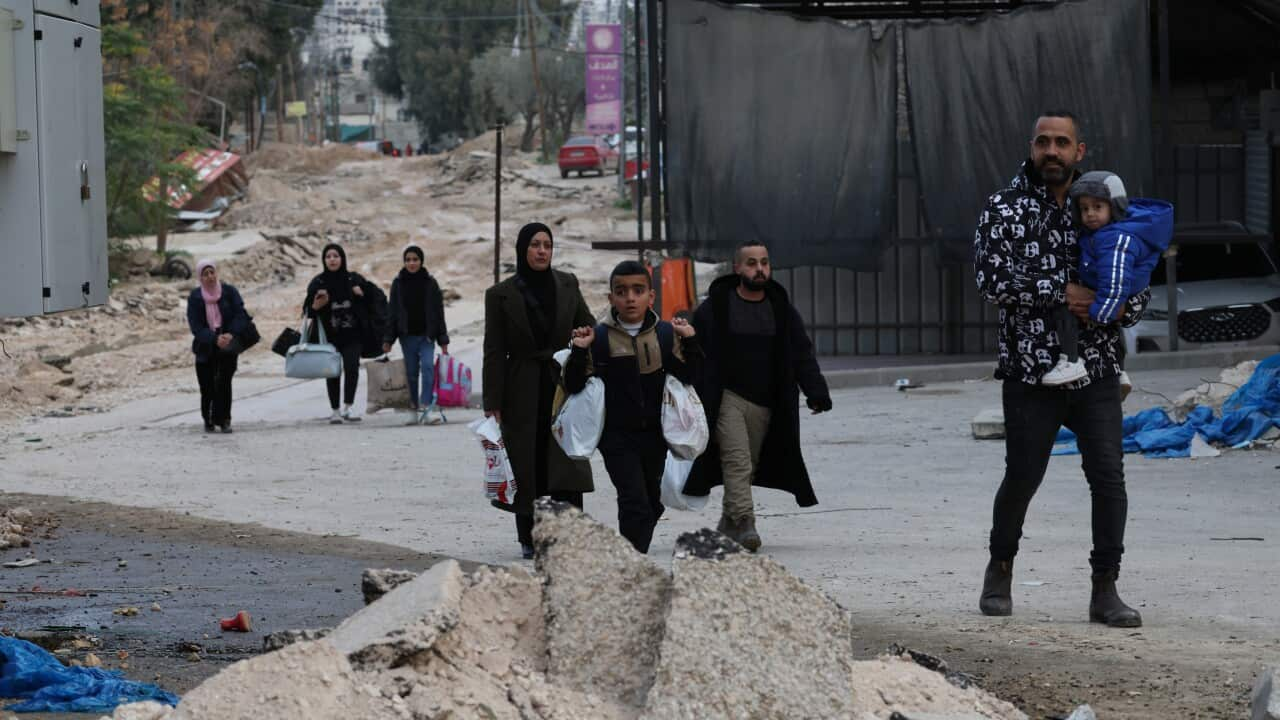TRANSCRIPT
Queuing for hours at checkpoints, on foot or by car, travel times ballooning to several hours.
Palestinians in the West Bank say multiple roadblocks have been set up throughout the occupied territory, where the Israeli military operation has expanded since the start of the war in Gaza.
“Before the war it used to take us from 15 to 20 minutes to enter or leave Hebron, now it takes three and a half hours to four hours. At the entrance of Hebron there is a checkpoint, then another checkpoint outside the city. Many gates are also closed so you have to go through dirt roads and you break your car. Even in dirt roads, we see checkpoints.”
While there is peace in Gaza for now, since Tuesday Israel has continued its military operation in the occupied West Bank, and suspected Jewish settlers have moved through two Palestinian towns.
The Palestinian health ministry says nine Palestinians have already been killed since the operation started yesterday. [[Tue 22]].
Israeli army forces have also blocked a road leading to a hospital as part of the military operation at the Jenin refugee camp, where the hospital is located.
This Jenin resident says it's almost impossible to get into or out of the hospital.
“The situation is difficult, there is nothing. There is nothing, no medicine, no food, the people inside the hospital have nothing. People want to leave the hospital and go home. They are risking their lives to go home.”
United States President Donald Trump, meanwhile, has rescinded the Biden administration's sanctions against Israelis accused of violence in the territory.
Israel says threats from the West Bank against its citizens are on the rise.
Earlier this month, Palestinian gunmen opened fire on motorists there, killing three Israelis, including two women in their 70s.
That attack fuelled calls from settler leaders for a crackdown in the territory.
Israeli Defence Minister Israel Katz cast the Jenin operation as part of Israel's larger struggle against Iran and its militant allies across the region.
United Nations Secretary General Antonio Guterres says while he hopes the next phase of the ceasefire will lead to an end to the war between Israel and Hamas, he's still concerned for the future.
“But there is another possibility, and the other possibility is for Israel - feeling emboldened by the military successes that it has had - to think that this is the moment to do the annexation of the West Bank and to keep the Gaza in a kind of limbo situation with unclear, unclear form of governance. It is clear for me that Israel is not fundamentally interested in Gaza. It’s fundamentally interested in the West Bank.”
The first phase of a ceasefire in Gaza is set to last for at least six weeks, bringing about the release of dozens of Israeli hostages in exchange for hundreds of Palestinian prisoners, most of whom will be released into the West Bank.
Viki Cohen looks around her kidnapped son's bedroom, hoping for his release from Hamas captivity.
She fears that any complications during negotiations on the second phase of the Gaza ceasefire could delay his return.
Her son Nimrod Cohen, now 20 years old, was a conscript when he was kidnapped on October 7, 2023.
He is not on the list of the 33 hostages, which is comprised of women, children, man over 50 and those who need medical care.
But she has hope she will see her son again.
“Everyday I imagine in my mind how the meeting with Nimrod would look like. That we hug him and welcome him and here at home I organised his room and got him new bedding and a new cover and I'm preparing and getting excited to see him.”
The war began when Hamas-led militants stormed into Israel on October 7, 2023, killing some 1,200 people, mostly civilians, and abducting around 250.
Around 100 hostages still remain in Gaza, after the rest were released, rescued, or their bodies were recovered.
Israel’s military campaign has killed more than 47,000 Palestinians in Gaza, according to local health authorities.













